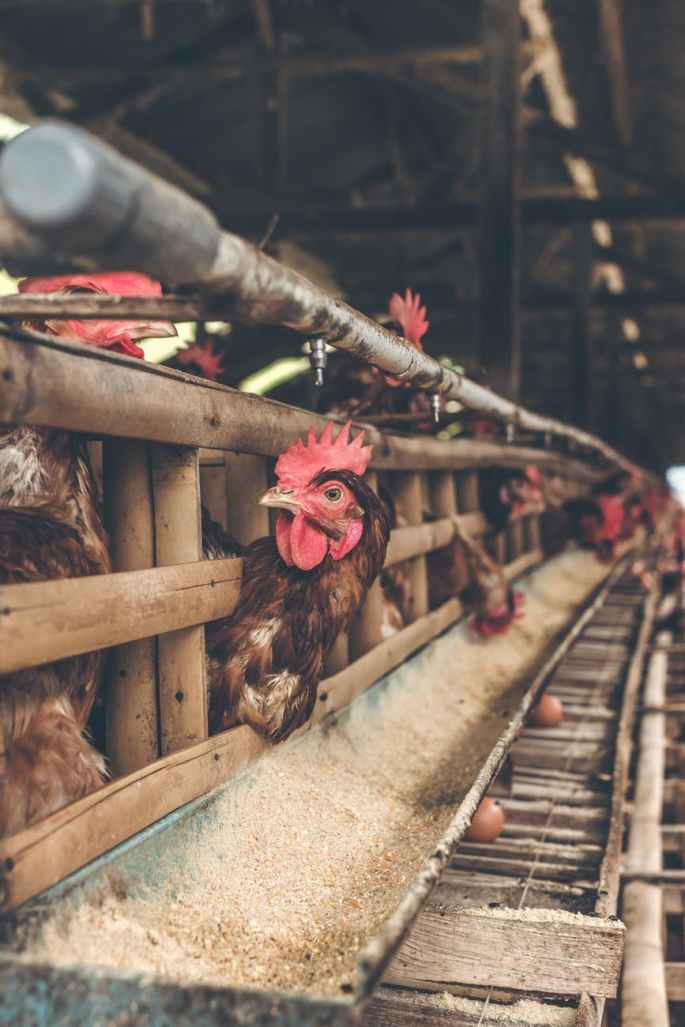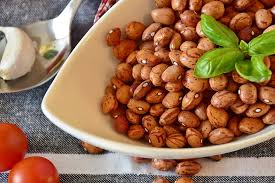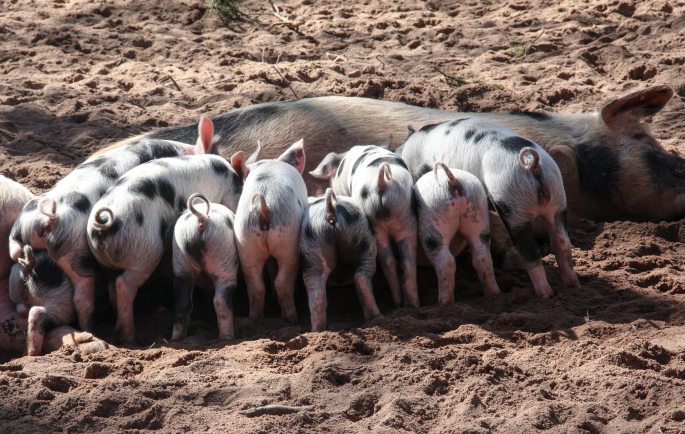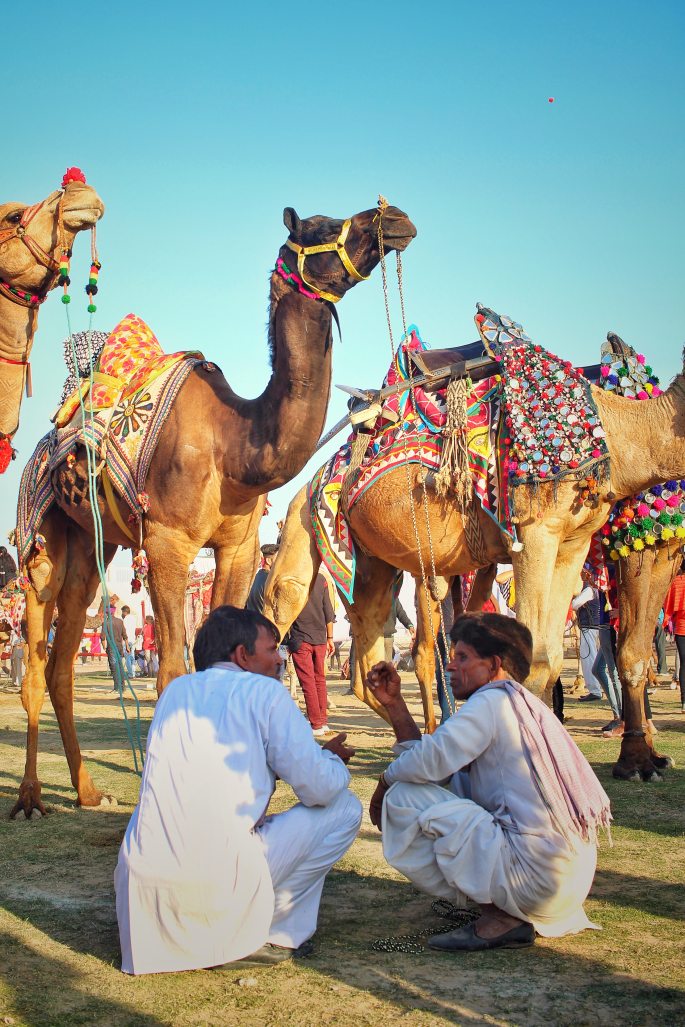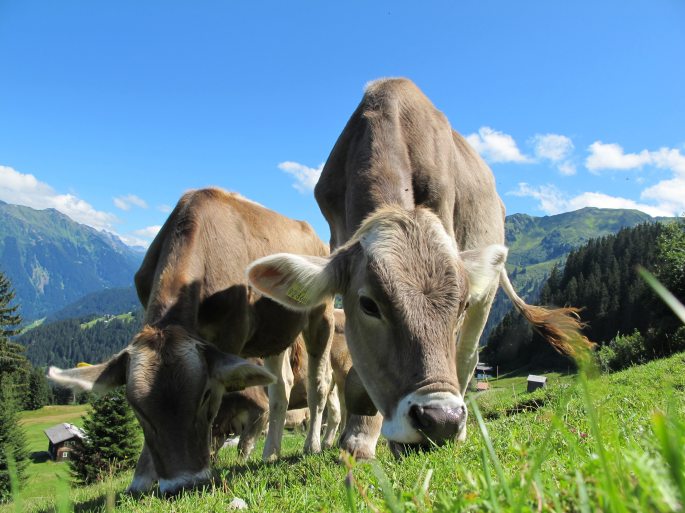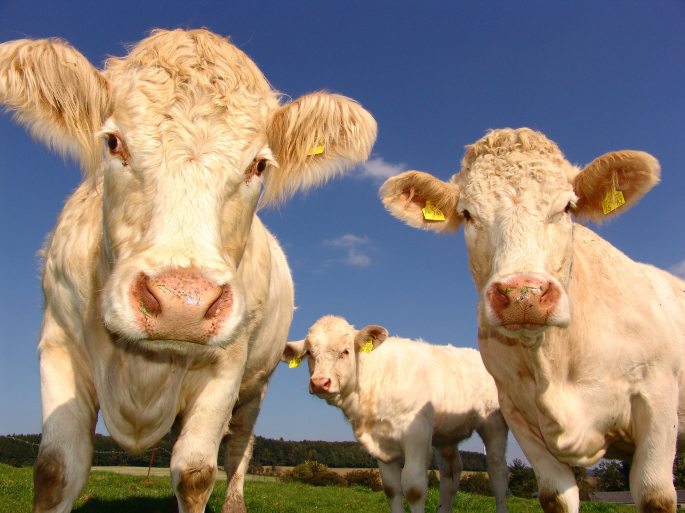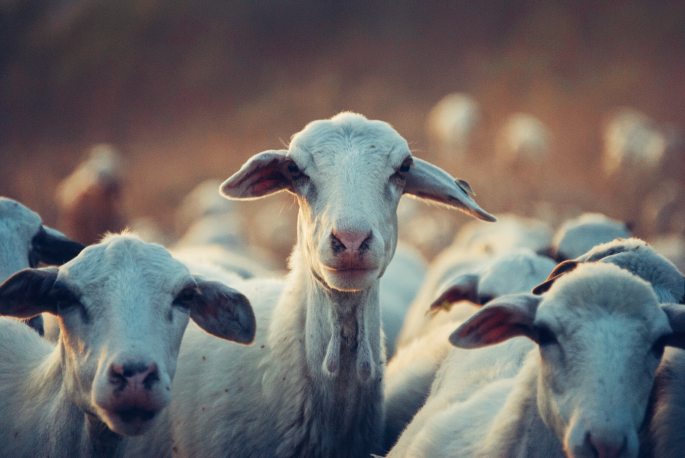
** This is a condensed version of a paper I wrote for my master’s degree; if you would like more info or sources please leave me a comment as some topics have been reduced or removed for a shorter, more blog-focused piece.**
“Judaism strengthens my choice to be vegan, makes the decisions I embrace daily even richer, deeper, and more fulfilling.” – Mayim Bialik, Jewish vegan actress and PhD
In the past few decades, Judaism has seen the emergence of the Green Kosher Movement, a movement that seeks to incorporate environmental, social, and animal rights issues into Jewish practice and belief. One key component of this movement is the focus on vegetarianism/veganism as the ideal Kosher diet, with rabbis and other Jewish advocates using both the Torah (Jewish Bible) and Talmudic sources to justify this practice. What do the Torah and Talmud say about eating animal products? What have historical and contemporary Jewish figures stated about vegetarianism as the Kosher ideal? And why is it NOW that Judaism is having its major vegan moment? Much of it ties in with addressing broader global issues from a Jewish perspective.
As Western society became more aware of the potential for destructive climate change, the animal suffering induced by factory farming, the slave labour involved in clothing manufacturing, among other atrocities, many Jews turned to the Torah and tradition in a search for ways to respond to these modern issues. Many Jews use the Garden of Eden from the story of Genesis to form the basis of their ideology. According to proponents of the movement “In the Garden of Eden everything was ethical and peaceful, land was cared for, and Adam and Eve did not eat animals.” The movement in some ways takes on Messianic undertones, with the message of many advocates, including those mentioned below, ultimately suggest that only this ethical living will bring about the Messianic age. Most Jewish vegetarians identify with the broader Green Kosher Movement, and many draw upon the overall message and sources in support of a vegetarian kosher ideal.
Choosing Vegetarianism
From the large list of books I’ve read by Jewish authors writing on the topic, the most common reason among their decision to go vegan was a general observation of animal suffering. Notably, the desire to go vegetarian sprang from less a Jewish standpoint than one of an increasing broader societal awareness of factory farms and the suffering inflicted on the lives of those animals. In some instances, writers’ decisions to go vegetarian inspired an exploration of Kosher law and even a deepening of faith or religious observance. The growth of vegetarianism appears to be a phenomenon particularly in Judaism and in Israel, where thirteen percent of Israelis identify as vegetarian, now the highest population of strict vegetarians in the world. Jewish publication Tablet Magazine’s article “Life After Brisket” suggests that the majority of vegetarians are driven more by animal rights than health or religion, though they discuss its obvious impact on religious life in the country. Amongst the books, articles and blogs collected, there appears a strong correlation between animal rights (and sometimes even a relation to Jewish suffering during the Holocaust) in decisions to become vegetarian.
Rabbi Yohansan Gershom writes in The Jewish Vegan, that he became a vegetarian after visiting a factory farm to purchase living chickens for his own land. Coming face-to-face with the birds he would have to kill was an awakening, and he could no longer eat chickens. His initial reasoning was not wanting to cause suffering to an animal, but after this he sought Biblical and Rabbinic support for his position. Jewish actress Mayim Bialik, famous for her role on The Big Bang Theory, also began her vegan journey with a general ethical concern for animal suffering, noting that, “I learned that they pump that poor bird full of drugs to make it grow so big that it can’t stand up. That was the end of eating turkey.” She writes regularly about her vegan lifestyle for a Jewish parenting website Kveller.com, where she emphasizes the ethical component of an animal-free diet, but also discusses its relationship to her Jewish faith.
Some Jews went vegetarian after drawing connections between the Holocaust and modern-day factory farms, with the Israeli vegan activist group 269 Life even calling meat consumption “the animal Holocaust.” Founders of the website Jewishveg.com are more cautious about using the term, but do relate the suffering of animals to the suffering of humans in genocide. Animal rights activist and Holocaust survivor Alex Hershaft went vegan after seeing images of factory farms, which provoked traumatic memories of his past:
“I noted with horror the striking similarities between what the Nazis did to my family and my people, and what we do to animals we raise for food: the branding or tattooing of serial numbers to identify victims, the use of cattle cars to transport victims to their death, the crowded housing of victims in wood crates, the arbitrary designation of who lives and who dies — the Christian lives, the Jew dies; the dog lives, the pig dies.”
Choosing Kosher Vegetarianism
For religious Jewish vegetarians, it was not as simple as giving up meat. In a tradition with laws that aim to minimize the suffering of animals but nonetheless actively accepts eating animals, and even praises the eating of meat and dairy at certain times, choosing to not eat meat posed a challenge to their religious and social identity. Meat and dairy play a central part in most main dishes, especially on holidays and Sabbath. As families and communities gather to recite blessings over Challah bread, Jewish vegans encounter difficulty and/or stigmatization when they cannot eat the bread because of the eggs. Being a religiously observant vegetarian Jew means the individual must find a way to validate their choices, which in turn leads many to the Torah and other Jewish sources such as the Talmud.
There are hundreds of sources from the Torah and other texts that Jewish vegetarians draw upon, but there are a few sources that are most popular and frequently used among advocates, especially The Sacred Table and The Jewish Vegan. Prominent Torah sources include the story of creation, which, as previously mentioned, highlights Genesis and the Garden of Eden as return to paradise. Many cite how an animal may not be slaughtered alongside its mother in order to highlight animal suffering and emotion (Leviticus 22:28). In Exodus 20:10 Jews are told that animals must also rest on Shabbat, highlighting their worthiness for respect and care. In Deuteronomy 22:10 owners are told that they are responsible for how animals are being used: one cannot plow with an ox and mule harnessed together, as the animals are of unequal size and strength and might suffer. In Numbers 11 during the exodus when the Israelites are in the desert and a group of them clamored for meat, Jeffrey Cohan argues that, “they were struck down and buried in the Graves of Gluttony.” Jewish vegetarians using these Torah sources often point to the inherent worthiness of animals in these passages, saying that if we respect animals enough to care for them, and if the Bible requires us to do so, we should also abstain from eating them.
Israeli Orthodox Rabbi Jeremy Gimpel looked at the way animals are treated in food production and stated, “There is a deep, deep Jewish belief that there is a sanctity to life,” and that modern farming cannot reconcile animal suffering with Jewish morality. Gimpel also spoke about the growing interest in vegetarianism among orthodox rabbis in Israel, and how they draw inspiration from the Torah and Talmud to argue that halakha forbids animals to suffer, which should now include killing an animal at all. Just as Jews no longer sacrifice animals, it is time to abandon killing them to eat them. Chief among the orthodox rabbis’ arguments is a Genesis passage in which God forbids man from severing the limbs of any living creature. Discussion and debate surrounding the Torah and vegetarianism has increased over the past decade, and many hope that with increased Biblical and Talmudic affirmation, the movement can continue to grow among religious Jews.
Belong and Identity: Vegan Challah and the New Normal
Celebrity endorsements often lend ample support to a cause, and the Jewish vegetarian movement is no different. The non-profit group Jewish Vegetarians of North America posted a list of famous Jewish vegetarians who have spoken about their dietary choices. Celebrities on the list include Natalie Portman, Alicia Silverstone, Sarah Silverman, Matisyahu, and Jason Schwartzman. Relating a celebrity’s veganism back to their Jewish heritage, whether they practice or not, provides support for this dual identity and popularizes the ideology. In a society obsessed with celebrity culture, the desire to find celebrity endorsement furthers the social and religious importance of validating a Jewish vegetarian identity. Similar to celebrities that endorsed the “It Gets Better” campaign for LGBTQ youth who are bullied, the Jewish vegetarian celebrities who endorse the movement are visible symbols that this identity is acceptable in Judaism. They share a message that not only advocates vegetarianism, but promotes a proud Jewish vegetarian identity. Underlying this advocacy and endorsement is the message that vegetarian Jews belong in the Jewish community, they too are an important component and voice in the global religious Jewish community.
Another endorsement of the vegetarian Jewish identity is found in the popular Birth Right Israel program. Birth Right is offering its first official Vegan Birth Right trip in 2017. Jeffrey Cohan, Executive Director of the non-profit Jewish Veg (which operates online at Jewishveg.org), has worked with the Birth Right team to develop a program that is inclusive to vegetarian Jews curious about exploring their roots and religion. He states poignantly, “so many young Jews who are vegan or vegetarian have become distanced from Judaism because their needs have not been met by our communal institutions… This is a phenomenal way of re-engaging them.” Jewish publication Forward Magazine notes that the Israeli army now makes vegan berets and clothing items for its incoming vegetarian military personnel. As Jewish institutions, from military and government to guided trips and restaurants begin to develop options for vegetarian Jews, they show a slow but growing acceptance of vegetarianism as a suitable and acceptable Jewish choice.
Jewish AND Kosher AND Vegan
This twenty-first century shift in dietary choices and restrictions resonates with the tensions surrounding food in broader Western culture. A perfect example is a cartoon that went viral in 2015, “If Jesus Tried to Feed the Five Thousand Today.” The image depicts Jesus standing with a loaf and a fish, with different speech bubbles of his followers exclaiming, “I can’t eat that, I’m vegan;” “Has that fish been tested for Mercury?” and “Is that bread gluten free?” While fad diets, food intolerances, and vegetarianism have become pronounced in Western society, they still often remain the subject of mockery. Jewish vegetarians and Jews with any alternative diet must work to find creative alternatives that enable them to participate in ancient traditions and rituals. Jewish food scholar Norma Baumel Joseph quoted French gastronome Jean Anthelm Brillat-Savarin on the subject of food and identity, who suggested, “Tell me what you eat, and I shall tell you what you are.” While Jewish identity is about more than food, this component plays a central part in the tradition, especially as tradition with some of the most noticeable food boundaries and restrictions in the world.
Sarah Chandler, a Jewish food educator and vegetarian, works directly with Jewish communities and families to develop vegetarian options for Jewish holidays, noting how many dishes include meat products. For Jews who want to celebrate Passover without eggs, they must get creative to find meaningful alternatives. Jacob Labdenz dedicates his chapter in The Sacred Table to exploring meaningful vegan alternatives for the Passover seder. Mayiam Bialik has published a vegan Jewish cookbook, and another Amazon bestselling cookbook is aptly titled New Kosher Jewish Vegan Cookbook. The growing number of volumes, non-fiction books and vegetarian Jewish food cookbooks highlight a growing need to find ways to bridge vegetarian identity with religious Jewish identity.
To be a vegetarian Jew in broader Western society is also an important identity distinction. Mayim Bialik writes about becoming a “Kosher Vegan,” noting that she is not only Jewish and vegan, but maintains any Kosher restrictions that still apply. Situating herself in American society but firmly as a Jew, her declaration of being a Kosher vegan enables her to distinguish herself as sharing the same ethic as a secular or non-Jewish vegan, while still being distinctly Jewish.
Looking to the future, the Kosher vegetarian movement is continuing to move towards acceptance. While no modern Israeli rabbi has issued a psak (official declaration) advocating a vegetarian diet, strides have still been made. In 2015 Beit Hillel, a consortium of 120 Orthodox rabbis, scholars, and community leaders in Jerusalem issued a paper that called for Jews to reduce their meat consumption in order to alleviate the suffering of animals. In 2010, just 2.6% of Israelis identified as vegetarian, but by 2015 over 8% of Israelis identified as vegetarian and 5% as vegan (13% of the total population). Such a significant rise in just five years is impressive, and the statistic includes Jews from across the spectrum all the way from Hasidic to secular. Perhaps by 2050, “tell me what you eat, and I will tell you what you are” might convey an image of a kippah-wearing Jew eating a vegan matzo ball soup as a normal image of Judaism. Jewish comedian Allan King offers a witty summary of every Jewish holiday with the line, “They tried to kill us, we won, let’s eat!” To which a twenty-first century vegan Jew relaying the sentiment to Sabbath dinner guests may, quite acceptably, respond, “oh, what a beautiful vegan challah!” Ask the Kosher vegetarian what they eat, and they can now comfortably tell you who they are.
Here’s a list of some sources for anyone who wants to nerd out further:
- Bialik, Mayim. “My Jewish Take on Thanksgiving,” Kveller, 23 November, 2015. Accessed 20 March 2017. http://www.kveller.com/mayim-bialik-my-jewish-take-on-thanksgiving/
- Bialik, Mayim. “I Became a Kosher Vegan,” Kveller, 8 February, 2012. Accessed 20 March, 2017. http://www.kveller.com/i-became-a-kosher-vegan/
- Bodzin, Robyn Fryer. “Being Vegan in a Jewish Communal Setting,” The Jewish Vegan. USA: The Shamayim V’Aretz Institute: 2015.
- Clayman, Sidney. “Vegetarianism: The Ideal of the Bible,” Rabbis and Vegetarianism: An Evolving Tradition. Massachusetts: Micah Publications, 1995.
- Cohan, Jeffrey. “The Prohibition on Causing Animals to Suffer,” The Jewish Vegan. USA: The Shamayim V’Aretz Institute: 2015.
- Cohen, Tova. “In the Land of Milk and Honey, Israelis Turn Vegan,” Forward online. Accessed April 10, 2017. http://forward.com/food/312445/in-the-land-of-milk-and-honey-israelis-turn-vegan/?attribution=blog-article-related-1-headline
- Dolfin, Josephin. “Holocaust Survivor Likens Treatment of Farm Animals to Modern Day Shoah,” Jewish Telegraphic Agency, 16 October, 2016. Accessed 20 March, 2017. http://www.jta.org/2016/10/06/news-opinion/united-states/holocaust-survivor-likens-treatment-of-farm-animals-to-modern-day-shoah
- Gershom, Yohansen. “Rabbi Birds and Rooster Chicks: How I Became a Vegetarian,” The Jewish Vegan. USA: The Shamayim V’Aretz Institute: 2015.
- Joseph, Norma Baumel. “T’beet: Situating Iraqi Jewish Identity through Food,” in Religious Lives and Landscapes in Quebec, edited by Hilary Kaell. Montreal: McGill-Queens University Press, 2017.
- Labendz, Jacob. “New Traditions for a Vegan Passover,” The Jewish Vegan. USA: The Shamayim V’Aretz Institute: 2015.
- Schwarta, Richard H. “Should the Mistreatment of Animals Be Compared to the Holocaust?” Jewish Veg, accessed 23 March, 2017. https://www.jewishveg.org/schwartz/holocaust.html
- Schoenfein, Liza. “As More Jews go Vegan, So Does Birthright,” Forward, 11 January, 2017. Accessed 24 March, 2017. http://forward.com/food/359724/as-more-jews-go-vegan-so-does-birthright/
- Stub, Sarah Toth. “Life After Brisket,” Tablet Magazine, 16 February, 2016. Accessed 23 March, 2017. http://www.tabletmag.com/jewish-life-and-religion/197361/life-after-brisket
- 269 Life, “About,” accessed 23 March, 2017. http://www.269life.com/about.html
